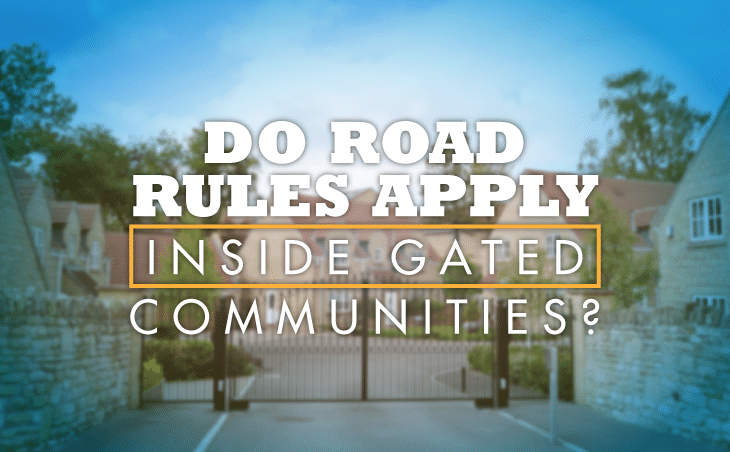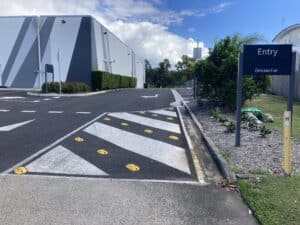


First and foremost, the misconception regarding the perception of these roads as private roads instead of public roads is the main factor leading to this confusion. When in fact, according to the national road legislation, roads within gated communities are still deemed as public and they still need to be used in accordance with national road rules.
Body Corporates within these housing estates may often implement road rules that are most suitable for its residents, and not necessarily in accordance with stipulated road regulations. Any breaches of these internally enforced rules are dealt with on a private basis within the estate management committee. Regardless, these privately implemented road rules cannot override national legislation. They need to always be kept in accordance with public road rules, and the enforcement of an internal penalty fee as opposed to a court-regulated fee is another area for debate.
A traffic fine cannot be issued by anyone other than a designated law enforcement officer. As is mostly the case – given the misconception of private roads – the Body Corporate will issue a penalty fee that is payable similar to the monthly levies. Because there is no actual law-enforced infringement, the severity of the incident is undermined and therefore more likely to recur.
When we consider the varying vehicles that utilise these internal roads, it begins to raise a few questions concerning the manner in which road rules are perceived. On a daily basis, it is not only the residents who are travelling on these roads; visitors, maintenance vehicles, golf carts and a variety of service delivery trucks all frequent these roads. So, surely this would mean that road rules should be abided by at all times and, moreover, that these road rules should be in accordance with national regulation?
We would definitely want these rules to follow national regulation when we are reminded of the fact that one of the prime reasons for residing in these communities is to allow our children the freedom to safely play in the streets. This really makes us re-evaluate the safety challenges for property managers in gated communities with resident families.
One of the greatest concerns is unlicensed drivers – who would not be allowed to drive on public roads – but are allowed to freely drive around within the gated complex. This poses a severe safety risk, especially in cases where a driver’s licence has been revoked due to misconduct. Similarly, vehicles that are only utilised within these gated areas are very seldomly checked for road-worthiness.
Vehicles such as golf carts and quad bikes raise concerns too. Golf carts are not intended for high speed as they do not have the manoeuvrability to turn sharp corners or an adequate braking system. And yet, in larger estates, golf carts are often used as the main mode of transport and consequently misused for its intended purpose. Quad bikes are all too often perceived as a toy, and therefore given to children without adequate supervision. While golf carts and quad bikes are not allowed on public roads, they are increasingly popular within estates, and driven without a vehicle licence by unlicensed drivers.
So in the event of an accident, who is to blame? The Body Corporate for allowing these vehicles to be driven? The negligent parent? Or the unlicensed child? And if these internal roads are perceived as being private, then what jurisdiction does law enforcement have? Again, as previously mentioned, all too often, these infringements are dealt with internally, unless the severity requires the notification of legislative officials.
In the event of severe injury or fatality a myriad of legal issues would be raised, such as whether the road is a public or private road, if the regulatory signage and markings were in compliance with legislation, and was any other person or party responsible through their carelessness other than the relevant driver.
Quite simply, all regulatory and other road signage, road markings, the positioning thereof, and the control and the use of vehicles on these public roads is no different to the public roads outside of the gated estate.
Road signs must conform to the prescribed colours, dimensions, and method of display of road traffic signs. Traffic calming measures need to be correctly installed. And the correct driving speed needs to be adhered to at all times. But what is the correct speed limit within these housing estates? And is the speed limit clearly sign-posted at regular intervals? In golf estates, there is often a long stretch of road where motorists can quite easily drive in excess of 60kph without anyone noticing.
We need to shift our perception and realise that these roads are still public roads used by many different people. And, while law enforcement may not be applicable, the same dangers and risks are evident when negligent driving occurs, and the legal ramifications are often far more severe when an infringement occurs within unlawful boundaries. Don’t wait for a sign post to dictate what speed you should drive, always act with caution and drive as meticulously as possible, regardless of the setting.
Installing traffic calming measures such as speed humps or rumble bars in gated complex settings, reminds drivers of the need to remain vigilant of speed and pedestrian safety.
The team at Speed Humps Australia would be happy to discuss the ways in which we can support road safety in gated communities. Contact us today on 1300 138 568 for more information and a quote.
This post was originally published on February 23 2015 and updated on February 22 2024. The information contained in this article is based on lengthy engagement with complex and body corporate managers and should not be relied on as legal advice. Information can vary between different states, local councils and body corporate situations.



For 10 years, our focus has been on one thing: to provide one style of product and to do it well.
Our wheel stops, speed humps and rumble bars meet Australian Standards, don’t fade, and we’ve never needed to replace one.

For 10 years, our focus has been on one thing: to provide one style of product and to do it well.
Our wheel stops, speed humps and rumble bars meet Australian Standards, don’t fade, and we’ve never needed to replace one.